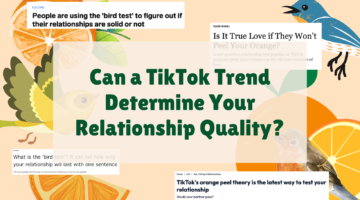Falling in Love with a Friend is More Common Than You Think
February 7, 2022 by Katie Adams
In the famous movie When Harry Met Sally, there’s a scene where Harry claims that “men and women can’t be friends because the sex part always gets in the way.”
The implication is that sexual attraction is inevitable in mixed-sex friendships between heterosexual persons—and that they’re eventually going to become friends with benefits or romantic partners.
Of course, sexual attraction doesn’t always emerge in these cases and not every friendship is going to follow the same exact path. But it is indeed the case the friendship often turns into love, just like Harry and Sally’s friendship did.
A recent set of studies sought to explore just how often people follow the friends-to-lovers pathway to romance because it’s something that has received surprisingly little attention in relationship research.
As part of this study, published in the journal Social Psychological and Personality Science, the authors reviewed 143 articles on relationship initiation and found that only 18% looked at relationships in which the partners started out as friends first.
Given that the bulk of the research on relationship initiation is focused on relationships that develop between strangers, this might lend itself to the impression that friends-first initiation doesn’t happen very much in the real-world.
But that wouldn’t be true.
To explore the prevalence of friends-first relationship initiation, the authors conducted a meta-analysis of seven studies involving approximately 1,900 adults from the US and Canada. The results showed that, on average, 68% of participants indicated they had been in a relationship where they were friends prior to becoming romantic partners.
When looking at diverse sexualities, the rate was even higher (85%) for people who were in same-gender and/or queer relationships (i.e., relationships that included two women, two men, or one or more trans/nonbinary people) compared to people in heterosexual relationships.
Thus, friends-first initiation appears to be very common in general, and it seems to be especially common for same-gender and queer couples.
This path to starting a relationship seems to be quite a desirable one, too. The researchers also conducted an online survey of 298 young adults in which they were asked what they thought the best way to start a relationship was. Nearly half (47%) said it was to be friends first. By contrast, participants were much less likely to say that meeting through an online dating service or out at a bar was desirable.
This research is not without limitations. For one thing, the results are based heavily on college-aged, Western, educated participants, who are not necessarily representative of the broader population. Relationship research should further investigate friends-first initiated relationships in diverse cultural and age groups. The way people develop relationships may vary considerably depending upon cultural norms, as well as what stage of life they’re in.
That said, these findings are important because they tell us that those who are studying relationship initiation would do well to expand their approach. Most research on relationship formation looks at meetings between strangers. When you consider that friends-first initiation is actually the single-most common and desirable way to start a relationship, we’re missing an important piece of the action by focusing so much on strangers.
This research also raises some provocative questions, such as whether relationships that grow out of friendships tend to fare better over time. To the extent that they have better communication and more intimacy, they just might.
Have you ever started a relationship with a friend before? What were your experiences like? Tell us about it in the comments section below.
To learn more about this research, see: Stinson, D. A., Cameron, J. J., & Hoplock, L. B. (2021). The Friends-to-Lovers Pathway to Romance: Prevalent, Preferred, and Overlooked by Science. Social Psychological and Personality Science.
Want to learn more about Sex and Psychology? Click here for more from the blog or here to listen to the podcast. Follow Sex and Psychology on Facebook, Twitter (@JustinLehmiller), or Reddit to receive updates. You can also follow Dr. Lehmiller on YouTube and Instagram.
Image source: Photo by John Hernandez on Unsplash
About the author:
Katie Adams is a Doctoral candidate at the University of Kansas in the Social Psychology program, working with Dr. Omri Gillath. Her research focuses on close relationships and the underlying motivations of attraction, sexual behaviors, and short- vs. long-term commitment. She is currently leading research projects on (1) the creation and validation of a measure for pornography consumption motives, and (2) social influences on perceived appropriateness and success of relationship initiation. She completed her bachelor’s degree at the University of Rochester (2014) and her master’s degree at Villanova University (2018). This is her third guest blog post for Sex and Psychology.

Dr. Justin Lehmiller
Founder & Owner of Sex and PsychologyDr. Justin Lehmiller is a social psychologist and Research Fellow at The Kinsey Institute. He runs the Sex and Psychology blog and podcast and is author of the popular book Tell Me What You Want. Dr. Lehmiller is an award-winning educator, and a prolific researcher who has published more than 50 academic works.
Read full bio >


